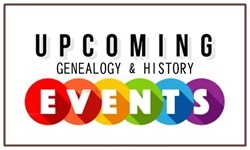Societies Need to Adapt, or They Will Die
This post has been inspired by Randy Seaver’s “What Should Genealogical Societies Offer? My 11 Suggestions” post which I read earlier this week, and let me start by saying I couldn’t agree with him more.
I realise that societies are small, volunteer-run organisations, but they NEED to adapt with the times to not only cater to current members, but to attract new ones, which will quite likely turn into more volunteers as well. Bringing in new volunteers has so many benefits simply apart from more hands-on people to help out, these new volunteers have skills that they can share or utilise. Some may be good at computers, some at cataloguing, some at one-on-one helping people, or answering research queries from afar, and some at social media. All of which are useful for societies these days.
First up here’s a summary of Randy’s 11 suggestions for societies:
1. A regular (monthly?) meeting in a public place that features some sort of educational aspect.
2. Special events to enhance social interaction among attendees.
3. A yearly seminar in a public place, perhaps with a sitdown or buffet meal for a cost with a well-known and respected speaker(s).
4. Regular workshops/user groups (weekly, monthly, quarterly) intended to help attendees learn about specific resources.
5. Genealogy education classes for beginners, intermediates and advanced researchers on a regular basis (e.g., annually).
6. Hands-on, one-on-one or small-group research help by mentors or experienced members in a semi-private environment.
7. Research trips to local repositories, family history fairs or conferences, or local historical sites.
8. A regularly published newsletter with news of upcoming events, highlights from past events, genealogy industry news, member research articles, local repository information, etc.
9. A website that is updated regularly providing society meeting and event information, the newsletter, society documents, event photos, etc.
10. Social media network pages – a society blog, a Twitter handle, a Facebook page, etc., with frequent postings to promote meetings and events.
11. Record collection, indexing and digitizing projects that help the genealogy community and provide members a way to “give back” and “pay it forward” the help they’ve received over the years to the genealogy community.
I agree it would be good for all societies to incorporate the above eleven ideas. But if not all eleven, there are are least half of them (in my opinion) are a MUST for societies these days. It’s simply what people expect.
I am a member of four societies. One overseas, two state level, and one town society. In analysing the ‘value’ that I get for my membership probably two out of the four get the thumbs up. Those ones give me regular updates of up coming events, new members, together with members interests, journals, as well as a members area on their website, and I can keep up with them through social media. The third covers some of those, but not all, the fourth gives me nothing, so I’m wondering why I would want to rejoin.
It’s sad that I feel that way, as they are a group that needs members, but seriously they offer their members nothing – so why would you? They don’t have a social media presence, in fact they don’t even have their own website. So there”s nothing that even tells you the type of records the hold. They don’t send out any newsletter advising of new acquisitions, or even highlighting current holdings. They don’t have meetings to encourage an interest in genealogy or history. And they are only open for a few hours one day a week – which is a weekday – which simply doesn’t suit working people. But what’s more is that they aren’t interested in opening on the weekend.
This is a society that I would actually be interested in volunteering for. But they aren’t even making an effort to change. And as such I’m reluctant to even offer.
The sad fact is that I don’t see this society growing in anyway. In fact I can see that those that run it eventually leave because they can no longer attend simply because of age, or ill health. Without change you simply won’t attract new members. Without new members the society will die. And trust me I would hate to see that happen to any society, anywhere.
But if those in charge of the societies aren’t willing to change, what can you do?
I’m thinking that as the society in question has their meetings on a weekday too (which is another annoying thing) as I can’t get to them, I might just write them a letter with a few thoughts in it, and see what happens.
Anyway that’s enough of my raving for today, so let me finish off with the quote below, and asking you what experiences have you had (good or bad) with societies you’re involved with?






Looking at that 11-point list, I’m pleased to see that Queensland FHS, http://www.qfhs.org.au, scores well.
Excellent! They are a great society, so I knew they would do well on based on 11 the point criteria.
Could not agree more Alona!
Unfortunately some societies are reluctant to change and also to genuinely include people who can contribute. Perhaps to the 11 points we need to add “appreciate your volunteers”: recognise and acknowledge their contributions. It’s not just a case of welcoming new members, it’s making them part of the organisation and valuing, and harnessing, their skills. Otherwise they become transient names on your membership database.
I also think openness and transparency of operation, including easy access to the records held, are so important. A good library catalogue of any sort is so important (self-evident one might have thought).
Excellent points Pauleen, thanks for adding them.
You’ve hit the nail on the head Alona.Each of the four societies I belong too could do with a shakeup.
All I’ll add to Pauleen’s comments is that Societies must have a process for continual evaluation in place.
I volunteered to help one Society with techie stuff several years ago and am still waiting for a response.
It’s frustrating when you feel you have something to offer, but the society doesn’t respond, or doesn’t want your help. What to do …
You know what gets me? Volunteering to help… and then the waiting for the red tape. (Sounds like Jill is familiar with this as well….) Bogged down in policy, procedure and bylaws, even those that want to contribute are restricted and prevented. Your post is spot on : change is absolutely required. Sadly, the folks that need to see this the most will not – because they are not on social or active online. How many people can we get to print this out and take it to their next society meeting to share?
Thanks for your comments Jen. And yes, I agree with you in that that those that NEED to read this won’t be. Which is why I’ll actually write some thoughts to the society in question.
At the end of October I took part in #Genchat via Twitter. After that Twiiter fest I wrote this post
http://anglersrest.blogspot.co.uk/2013/11/genchat-31st-october-2013.html
Yesterday, I posted a question to the Facebook page that is run by one of the Societies I belong to. It was a simple question – I had read something, I knew I had, yet could not find the details. So instead of pointing me in the direction of something useful I received a private message which said “why not write to X”
In the meantime X had responded to me via the Facebook post, posted not only the answer but directed me to the location of the details. Thus also giving a degree of profile to the issue I raised, which had a benefit to the organisation and the membership.
The private message came to me, from someone who acts on behalf of the Society and fails to see that the reason I posted to a public arena was to engage a response and a public one.
Now I am pretty thick skinned, but the private message responder is known for providing the ruler smack if someone steps out of line – not in a naughty way, but perhaps asks a general question with a few specifics about living people. Nothing really privacy driven, but it might be.
The point is, this person is older in terms of membership and age, is educationally intelligent, yet has zero people skills and dishes out responses like these on a regular basis by responding privately. The private responses are a devious way of being a miserable so and so without being in a public arena. There is no obvious understanding of the point of social media. Responses such as this will and probably do alienate some of the membership.
At AGM the person is like many others is systematically re-elected because no one, or few people come forward to push the instance to a ballot.
In order to have change and change that is successful, the leadership needs to be right and in some cases that is the sticking point. Many Societies are bogged down in red tape that is dated and some societies are run like it is the board room of ICI.
What can I say Julie, but Wow. Thanks for taking the time to respond and pop your thoughts on here. It is really appreciated, and you have some fabulous points in your blogpost too (so thank you for sharing that).
I realise that for any society or group there’s a whole stack of factors, and each of these needs to work together for the change to work. In the meantime I do hope that my society will be open to considering some change. I’m not hopeful, but I can only try.
Hi Alona
Just wanted to say that Genealogy Sunshine Coast which I am a member of is a fantastic group of people. They are very up to date and always find ways to engage members and prospective members in informative events. You always feel comfortable whenever you visit the centre and I have learned so much from the experienced researchers there, who are more than willing to help at anytime. I attended a very interesting talk on DNA recently and tomorrow I am attending a Military research talk, which my husband is also coming along for. Their resource collection is amazing and I have put my hand up to volunteer in the library every Wednesday next year. I thought it is the best way for me to learn about the resources at my finger tips as well as maybe help someone else.
I would say they have no trouble achieving the list of 11 items at all…maybe even some more 🙂
Follow the link below its well worth a look.
https://sites.google.com/site/genealogysunshinecoastinc/
Cheers
Michelle
Totally agree, I’m about to let two of my memberships lapse and I know some societies that will simply fold when the current volunteers get a little older. Technology and social media are not that hard to embrace and with it comes younger members.
I’m going to stick my neck out and say that I think Randy is wrong.
It’s not that his suggestions are bad: far from it. A society that actually sets out to teach its members how to get the best out of resources, rather than acting as a private social club, is a wonderful thing. But – and this is the kicker – I question the priorities. 50% of our society are non local, and for them the Internet is pretty well all they get besides the quarterly journal (we’re on a smallish island, so there is a hard boundary between local and non-local). Adding all the extra local meetings benefits a group of maybe 40-50 people, certainly no more than that.
Locals of all ages are actually pretty resistant to using tech – I ran a survey about 12 months ago and had a small number of local replies that were almost aggressive about how they had no desire to engage with computers and did not see why anyone else should. I think that the first focus actually should be on the web side, and the local culture needs to change – but saying that as an “incomer” tends not to go down well…
To highlight another perspective of the conversation – some societies wil be registered as not-for-profits, and in that case their focus will or should be their wider charitable aims rather than just what they deliver to members. I know I’ve been guilty in the past of evaluating family history societies strictly from a consumer standpoint – what do I get for my membership and is it value for money? – without considering what I’m really doing by being a member, which is saying yes, I believe our history is an important part of our culture and I support your efforts to preserve and promote it.
Of course, if any society isn’t doing that and also isn’t providing any benefits to its members then it’s hardly a tragedy if it does die. All organisations outlive their usefulness eventually.
Alona,
Great timing on this post. I’m in almost exactly the same situation as you with my local historical society – no web, no social media, no library index, no index of journal articles, no collection catalogue.
They do have regular meetings and a really great journal. But that’s it.
However, rather than not joining, I’ve taken these missing elements as an opportunity. Rather than say they don’t offer me anything, I won’t join, I’m coming at it from the other direction – what can I offer to make the group better and hopefully bring more people in!
Like you I work full time, so any week day activities are out of the question for me. But I’m great with blogs and social media, so that’s where I’ve been able to make headway. While many in our group are firm in their decision that they won’t use computers, they have no problem with other people bringing them into the society. So I can do pretty much whatever I like. So I’ve started a blog – adding up coming events, families we have resources on and I am working on an annotated index of our journal – all 15 years worth (about half done).
And I’ve managed to talk them into running a research day, once a month on Saturday morning, to allow the full time workers an opportunity to come along. The first couple of days have been slow, just me and another member, but we’ve used the time to start re-organising the collection into a more useable form. The benefit of being a driving force is that while you do the work, you get it organised how you want!! So far there hasn’t been much buy in from other members, but I realise that takes time. Once it’s been going a while and they see it isn’t just some flash in the pan, I see them becoming more involved. In the meantime I am using the quiet time to get better organised.
It’s a matter of being willing to compromise and keep other peoples interests and skill in mind. I want to start digitising our collection. I looked at several tools for doing this. I narrowed it down to digital camera or digital document camera (HoverCam type thing). I went with a straight digital camera for a number of reasons, but one of the main ones was that the computer phobic people would be happy to help if they could use a camera, as no computer was involved. It was technology they were comfortable with and happy to use. A small but important thing to keep in mind.
This group hasn’t really made an effort to change, but once I’ve become involved, they haven’t actively blocked the things I’ve been doing either. I think that an influx of new blood can revitalise the group as a whole. Current members can do stuff I can’t – run tours during the week, run classes during the week. But I add my skills to things they can’t do – web, research etc. It’s a matter of balancing our skills and interests and making it a win-win situation.
I’ve gone in with open eyes, realising that I am trying to break into a close knit group who have been part of the group for many years. I have to hold back on voicing my opinions sometimes (and boy is that not natural for me!), but I know I need to do that if I want to make the changes I think need to be made. And that does present some challenges, but I think that they are worth it, because I think the society will be stronger for it.